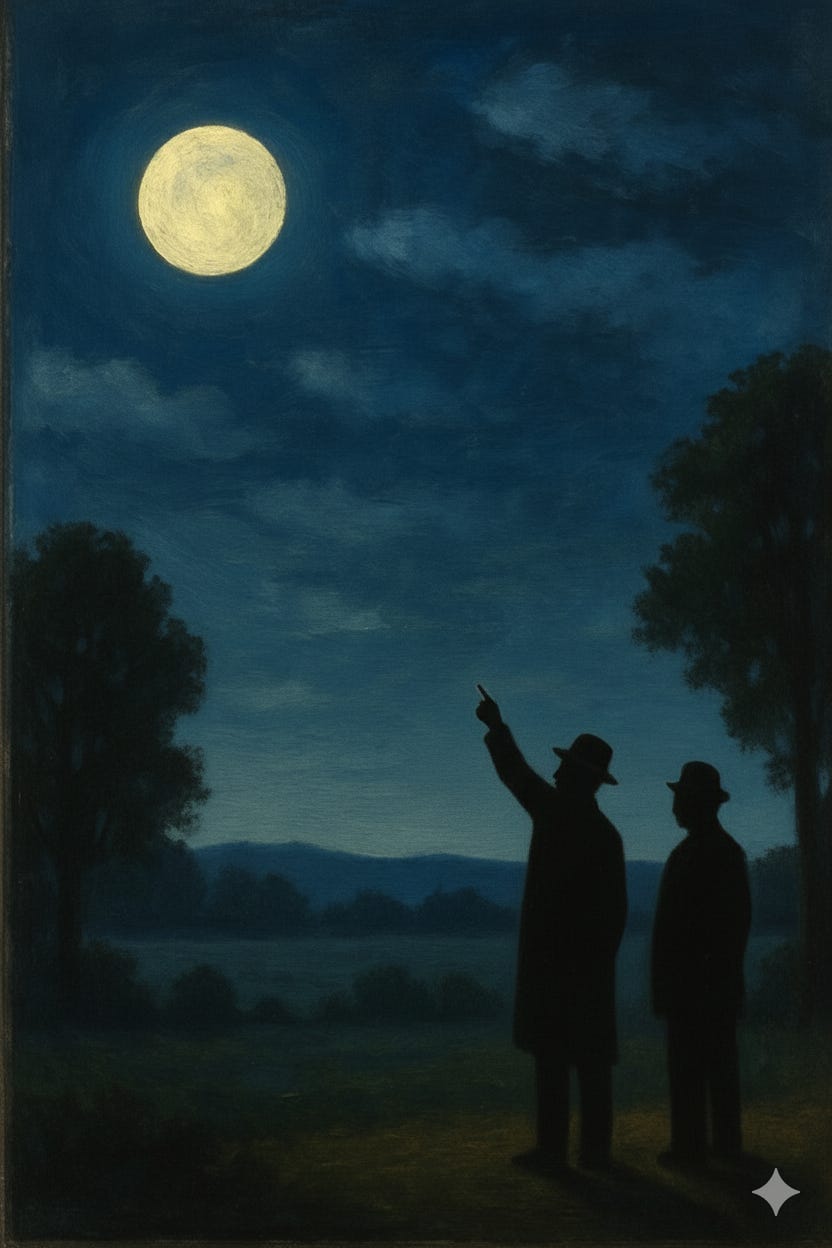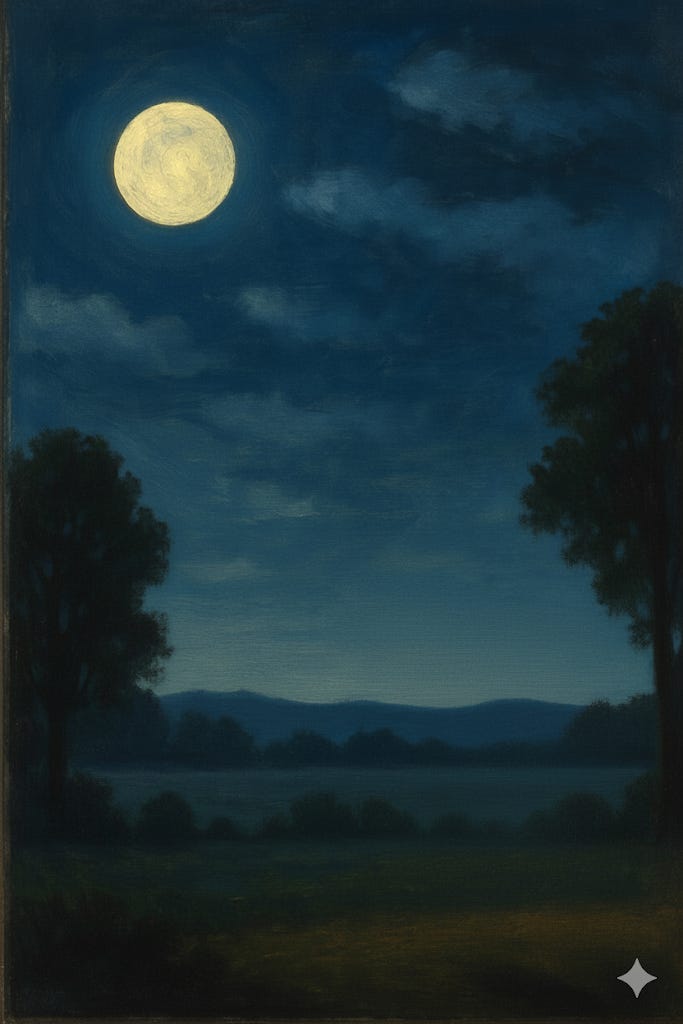A and B
A dialogue
B: I just finished your prose poems. Those are pretty grim. Especially the sandcastle one. Forgive me if I skip the obligatory “is everything alright?”
A: Yeah, I've been going through some stuff.
B: May I ask what that stuff is? I figure it's not fear of nuclear war. Fear of death?
A: I don't think so. If God told me “You need to die tonight but everything you care about will be looked after. Your family will mourn you but flourish. Your friends will prosper.” I'd definitely bargain for all I was worth to not have to, but I think I'd be, if not cool with it, then accepting.
B: Alright. Tell me what realization you had before or around the time these imaginings of disintegration came to you?
A: I realized that everything I wanted at twenty years old, I now have at forty years old. Some things I didn't achieve, but those weren't the important things. Everything important, intrinsically valuable, I achieved.
B: (pause) … Congratulations?
A: But I don't know what to do now that I'm here.
B: So you want to not have those things? As in, take some of them away?
A: No, it's not that I don't value those things. It's that… I don't want anything anymore.
B: Your twenty year old self was prescient, then - you wanted things, you got them, and now you're satisfied. Right?
A: But I'm not. Or… I don't know what I am.
B: Happily married, a proud father, gainfully employed, financially secure, a homeowner…
A: But I know I'm going to lose every single one of those things. Sooner or later, quickly or slowly, all at once or piece by piece, possibly in unbearable agony.
B: Okay, then this isn't a midlife crisis.
A: I thought it was.
B: Yes, but you don't have the usual marks - mistress…
A: I love my wife. Also, that doesn't seem like it actually solves anything.
B: Motorcycle… Or sports car.
A: I think those are stupid. Also, I don't believe I can buy anything to feel better.
B: Yeah, self-knowledge and reflective equilibrium can be a son of a bitch sometimes. You also aren't switching careers.
A: Why? I've built a good reputation at my employer, and I like the people I work with. Also, I think I'd just be at the same point in a few more years if I did something else.
B: Didn't you want to be a philosophy professor at one point, and then you had entrepreneurial ambitions?
A: I just don't believe, given how I feel now, that success in any other endeavor would change what I'm feeling now. It's like I've got to the top of the mountain and the view doesn't compensate for the fact that every path leads down into darkness, some ways steeper than others.
B: Sounds like fear of death. Aren't you a Christian, a traditionalist one at that? No postmodern irony for you.
A: Yes, but when you're a traditionalist you take seriously “He that findeth his life shall lose it: and he that loseth his life for my sake shall find it.” And I just realized that I do take it seriously.
B: You read the fine print on your faith, then.
A: Yes. You don't get resurrected or transfigured without dying first, in body, mind, and spirit.
B: Okay, it's dying you are afraid of, not death. Specifically, a part of yourself you have always identified with is dying in the near term, and you are concerned that you aren't anything without that part.
A: How did you know?
B: We are the same person. We've just been separated for the purposes of a dialogue.
A: So, when this dialogue ends and we’re identical again I won't be afraid of this?
B: No, not that easy. We’ll still be afraid. That part of us will still be dying. Builder, planner, striver, innovator: they've done their work.
A: Things just feel empty without something to strive for.
B: Without something beyond the present moment?
A: Exactly. Some goal, some desire, even some thought I'm chasing.
B: What does the present feel like without those?
A: I don't know! But I also know I don't want to face that… It’s like I can only see the end and nothing between now and then means anything, it's just blank space. It could last for a minute or a hundred years, and it wouldn't matter to me. And being in the present moment just means facing that. And I don't want to.
B: You’ve been pretty good at that. Not being here, being someplace else. Ever wondered why?
A: Why I’m good at that?
B: No, why you do it so often so that you became good at it, practiced at it, habituated to it.
A: I don't know.
B: Here's a hypothesis - not a truth claim, an idea to test. Remember how you started into young adulthood? That axial time?
A: What do you mean?
B: Those first times, those ups and downs, those were overwhelming, weren't they? Sliding your fingers into the wet place between her thighs, both of you gasping, and realizing it was you who was causing it, that she wanted you? Ecstasy in climax that slammed into you so hard it left you gasping, then made you afraid, but at the same time desperate for more? Sadness greater than you thought you could bear without breaking apart? And so, you retreated…
A: Into abstraction. I can recall it so clearly - seventeen years old, a July evening, the sun setting, on her parents’ porch, her sitting on my lap, kissing and talking. And I was talking about free will, whether it was actually a thing. She might as well not have been there.
B: Yeah, you weren't present with her very often, were you?
A: No… Nor many other people to be honest. Ever since.
B: And then you studied philosophy, of all things. Remember losing track of time thinking about modal logic, or getting up early to read Kant before anyone could interrupt you? Standing in the middle of a party, sipping red wine, thinking about supervenience, not talking to anyone else?
A: It was a fortress. A way to control things. If I could just think hard enough, I could solve the puzzle of life before I had to actually live it. And if I didn't solve it, I could escape into my head, and everything would be okay. And I could think about what I wanted, then go after it.
B: A perfect strategy for a young man terrified of the beautiful, chaotic mess of it all. The shield worked. But now the war you were fighting is over. You won. You powered through and achieved the things you wanted. And you're still carrying the shield, but now it's just blocking the sun.
A: So what am I supposed to do with it?
B: Put it down. But that's hard, isn't it? It's become part of your arm. It feels like who you are.
A: It does! I don't think there's anything to me but the analyzing, abstracting, planning, achieving part. Does that make sense?
B: Yes. The advice says “live in the present” as if that's a switch you can flip; that's definitely a little bit too glib.
Out of curiosity, are you the narrator in the car crash story?
A: No, I feel more like the narrator at the coffee shop seeing the pinprick of light and understanding intuitively that everything is doomed.
B: Dramatic.
A: True. But also, banal. Everyone dies. Everyone loses. And you don't get to choose how … or when … or why.
B: And yet you keep circling back as if saying it, thinking it enough times will make it tolerable.
A: But every time before I've had problems, thinking them through worked. You're saying it won't work this time?
B: No. It only makes it sharper, keeps it cutting into you. The jagged glass doesn't get any less sharp the more you squeeze it. You have to drop it. Words can pose the question. They cannot give the answer.
A: Then what?
B: Then we stop. We let the words fail. We let the sandcastle be erased.
A: And just sit here?
B: Yes. Sit. Watch the tide. Listen. That’s the only answer we’re permitted in this medium.
A: And outside this medium?
B: You already know. You’ve practiced it before: prayer, silence, presence, attending, receiving. But you won’t find that here. Here we can only point.
A: I'm afraid of what I'll find in the silence. Or what I won't find.
B: You're afraid you'll find the emptiness you've been running from. The blank space.
A: Yes.
B: But what if the blank space isn't empty? What if it's just... room? Room for whatever will come to you when you attend and receive, rather than plan and shape?
A: I don't know how to look at it that way.
B: I know. We've spent forty years learning how not to. So, we'll have to learn. Together. By letting this conversation end.



